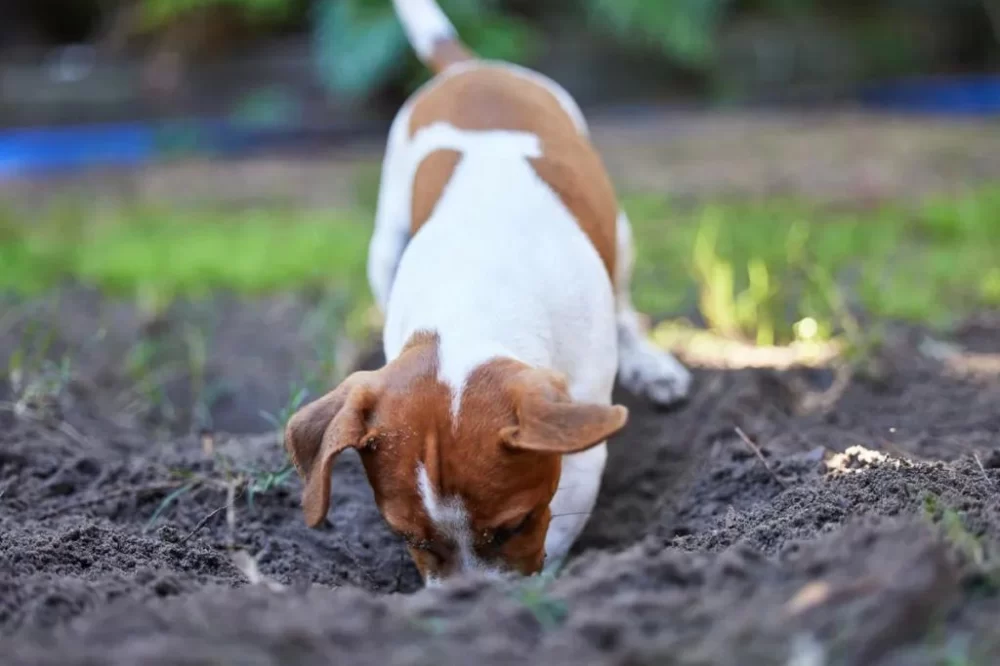- Understanding Dog Digging Behavior
- Identifying Causes of Digging
- Strategies to Prevent Dog Digging
- Real-Life Case Study: Turning Digging into Positive Behavior
- Additional Professional Advice and Resources
1. Understanding Dog Digging Behavior
Dogs digging holes in the yard can be frustrating, but it’s important to recognize that digging is a natural instinct for many dogs. Wild ancestors of domestic dogs dug to find food, create shelter, or cool off. This behavior often carries over even in our modern pets. Understanding why your dog digs is the first step in addressing the problem effectively and humanely.
Digging is also a form of physical and mental stimulation. When dogs feel bored, anxious, or under-stimulated, they often resort to digging as an outlet. Some breeds, especially terriers and hounds, have stronger digging tendencies due to their genetics. Recognizing these behavioral and breed-related factors helps tailor solutions that really work.
1.1 The Role of Instincts and Breed Characteristics
Some dogs have an innate drive to dig because of their original working roles. For example, terriers were bred to dig out burrowing animals, which explains their persistence in digging holes. Understanding this can help owners develop breed-specific approaches to prevent destructive digging.
1.2 Emotional and Environmental Triggers
Aside from instincts, digging can be triggered by separation anxiety, lack of exercise, or even the weather. Dogs may dig to cool themselves on hot days or to escape from uncomfortable situations. Observing when and why your dog digs will help you intervene more effectively.
2. Identifying Causes of Digging
Before attempting to stop dogs from digging holes in your yard, it is crucial to identify the root causes of the behavior. Here are some common reasons:
2.1 Boredom and Lack of Stimulation
Dogs left alone for long periods without sufficient physical activity often turn to digging to entertain themselves. This not only damages your yard but can also escalate into more problematic behaviors.
2.2 Seeking Attention or Escape
Some dogs dig to get attention from their owners or to escape confined spaces. If your dog feels lonely or stressed, digging might be a way to communicate their discomfort.
2.3 Hunting Instinct and Burrowing
Dogs with strong hunting instincts may dig to chase after small animals or insects hiding underground. This natural curiosity can be managed but not completely eliminated.
3. Strategies to Prevent Dog Digging
Once you understand why your dog digs, you can take practical steps to prevent the damage while keeping your dog happy and healthy. Here are detailed, effective methods that have worked for many dog owners:
3.1 Provide Sufficient Exercise and Mental Stimulation
Regular physical activity is critical. Long walks, playtime, and interactive toys can keep your dog’s mind and body engaged, reducing the urge to dig. Puzzle feeders and training sessions can also help channel their energy positively.
3.2 Create a Designated Digging Area
Rather than trying to eliminate digging altogether, provide a specific spot in your yard where your dog is allowed to dig freely. Train your dog to dig only in that area by rewarding them when they comply. This approach respects the dog’s natural behavior and protects the rest of your yard.
3.3 Use Deterrents and Yard Modifications
To protect vulnerable areas, consider physical barriers like chicken wire under soil or strategically placed rocks. You can also use safe deterrents such as citrus peels or commercial sprays designed to discourage digging. Always ensure that these deterrents are pet-friendly and non-toxic.
3.4 Address Anxiety and Separation Issues
If digging is driven by anxiety, behavioral interventions are needed. Gradual desensitization, providing comfort items, or consulting a professional trainer or veterinarian can be highly effective. For severe cases, veterinary advice can lead to tailored solutions.
4. Real-Life Case Study: Turning Digging into Positive Behavior
Consider the story of Max, a lively terrier mix whose owner struggled with constant yard damage due to digging. After assessing Max’s needs, the owner introduced daily structured playtimes and created a designated digging pit filled with soft soil and buried toys. Max learned to dig in this area, and the rest of the yard remained intact.
This approach was supplemented by consistent training and positive reinforcement. Within weeks, Max’s destructive digging ceased, and the owner reported improved behavior and a happier pet. This case shows how understanding your dog and adapting solutions can bring lasting change.
5. Additional Professional Advice and Resources
For owners who want expert guidance on how to stop dogs from digging holes in yard effectively, consulting veterinary professionals is a smart choice. Hidden Brook Veterinary offers tailored advice, products, and behavioral services to help manage digging and other canine issues.
From recommending calming aids to specialized training tools, professional support can accelerate the process and improve your dog’s well-being. Investing in expert consultation ensures that you address both the behavior and underlying causes responsibly.
Protecting your yard from digging does not mean suppressing your dog’s natural instincts harshly. With patience, creativity, and professional insight, you can create a harmonious environment where your dog feels fulfilled and your yard remains beautiful.











